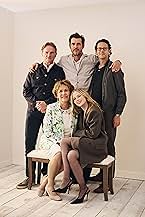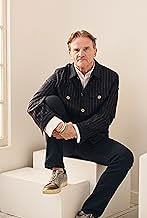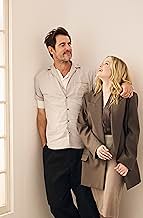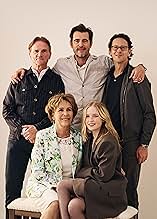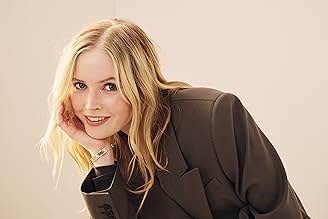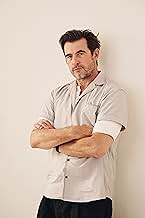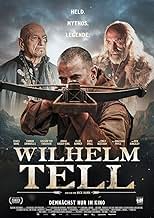The narrative unfolds in the 14th Century amidst the days of the Holy Roman Empire where Europe's nations fiercely vie for supremacy and the ambitious Austrians, desiring more land, encroach... Read allThe narrative unfolds in the 14th Century amidst the days of the Holy Roman Empire where Europe's nations fiercely vie for supremacy and the ambitious Austrians, desiring more land, encroach upon Switzerland, a serene and pastoral nation.The narrative unfolds in the 14th Century amidst the days of the Holy Roman Empire where Europe's nations fiercely vie for supremacy and the ambitious Austrians, desiring more land, encroach upon Switzerland, a serene and pastoral nation.
- Awards
- 1 nomination total
- Director
- Writers
- All cast & crew
- Production, box office & more at IMDbPro
Summary
Reviewers say 'William Tell' is lauded for its strong performances, stunning cinematography, and historical authenticity. The narrative of rebellion against tyranny resonates, though dialogue and pacing receive mixed feedback. Some find the script theatrical, and the middle section drags. Historical accuracy and character portrayals are debated. Despite these issues, the film's epic scope and emotional depth make it a compelling historical drama.
Featured reviews
Ok, this isn't going to win any Oscars, but it's really not as bad as the rating and reviews suggest. Yes, it's a bit hammy sometimes (thank Ben Kingsley for most of the hamminess!), but overall it's quite entertaining.
Claes Bang (William Tell) is always good value and most of the supporting cast are quite good. The cinematography is spectacular, up in the mountains, with soe stunning vistas. The battle scenes are quite good and they certainly spent some money on them.
It's set up for a sequel, but what are the chances it gets made in today's movie world?
Claes Bang (William Tell) is always good value and most of the supporting cast are quite good. The cinematography is spectacular, up in the mountains, with soe stunning vistas. The battle scenes are quite good and they certainly spent some money on them.
It's set up for a sequel, but what are the chances it gets made in today's movie world?
Had to turn it off after so many sea voyages which appeared to be made out as a if they were on the North Sea. Between Switzerland and Austria? Awful. While this was dreadful and mind numbing even as a bit of background noise it became too much to cope with. Not sure why reviews have to be so long so again I'll just say don't bother. Walk your dog for the 5th time today go to the toilet, even if you don't need to. You can read the ingredients on the shampoo bottle, It'll be more entertaining even if you know them word for word. Then move onto the shower gell. Enough words almost now. It's awful cheers.
I found this historical drama enjoyable enough, if of highly questionable historical accuracy. The anachronistic role of women and the racial diversity of the cast is forced, very distracting, provides an unnecessary backstory to the lead character and thereby detracts from the power of the story telling. The CGI, particularly in the water-borne scenes, is poor because it is not that well done, too noticeable and in most cases unnecessary. The film makers should instead have allowed the mountain scenery to work the magic. It is really beautiful although it is not authentically Swiss (the end credits reveal it was filmed in the Italian Tyrol). The violence and the battle scenes are handled competently. Look out for a leg being detached with a scythe and a genuinely stomach-churning and realistically portrayed through-the-eye stabbing. The famous shooting the apple scene comes about half way through and seems a bit incidental to the screenplay, perhaps inserted only because audiences will expect it. All in all, there's plenty to criticize but enough positive points to make it worth watching. The end scenes set up a sequel but actually make this film end awkwardly.
Hmmm. Never before have I heard anyone proudly declare "We are Swiss" in quite such an underwhelming manner before, and that rather sums up the lacklustre performance of Claes Bang as the title character in this verbose crossbow chronology. Traumatised by his experiences in the Crusade, he's now not a natural rebel but is instead content to live peaceably with his wife and son. When he comes to the rescue of a stranger whose wife had just been raped and murdered by the occupying troops of the King of Austria (Sir Ben Kingsley) his former valiance is rekindled and releases all manner of hell on his unprepared, unarmed and unsuspecting people. Pursued by the maniacal "Gessler" (Connor Swindell) and his blonde henchman "Stussi" (Jake Dunn), he has to rediscover his skill with the arrow, and yes - there's the legendary scene with the apple and the boy's head! There is some stunning Alpine photography mingled in with the pretty obvious CGI, and to be fair to it there are plenty of action scenes as Tell and his rapidly increasing circle of friends proves to be quite adept at reducing their foes to wriggling corpses. Sir Ben has managed to fish out his eye patch from "The Last Legion" (2007) but like Sir Jonathan Pryce, he doesn't really feature enough to make much more than a few cameo appearances to add a little bit of Thespian gravitas to this rather sterile and flat history. The characters are really lacking in charisma in this film and the long-winded dialogue and charm-free efforts from all but, perhaps, Dunn - think a weedier version of "Stamper" from "Tomorrow Never Dies" (1997) just don't really resonate much at all. There's plenty of attention to the creative detail with the costumes and castles all fitting the bill nicely but it's probably half an hour longer than it needs to be and screams sequel at us at it's all rather rushed end.
To all the naysayers sharpening their quills, let's get real: William Tell isn't trying to be Braveheart 2.0 (and thank goodness-no one needs another freedom speech in blue face paint). Instead, this film carves out its own niche with a crossbow and a wink.
Sure, some critics are acting like Tell missed the apple and shot their popcorn instead. But let's give credit where it's due: Claes Bang brings more charisma to the Swiss Alps than Mel Gibson brought to the Scottish Highlands. The villains are deliciously over-the-top-Ben Kingsley could probably glare a mountain goat into submission-and the scenery is so gorgeous you'll want to book a flight to Switzerland (or at least Google it).
Is it perfect? No. But neither is Braveheart (historical accuracy, anyone?). If you're looking for a fun, action-packed legend with a dash of heart and a lot less kilt, William Tell hits the mark. So loosen up, critics-sometimes a movie is just a good time, not a history lesson or a revolution.
Let me know if you want more zingers or specific references!
Sure, some critics are acting like Tell missed the apple and shot their popcorn instead. But let's give credit where it's due: Claes Bang brings more charisma to the Swiss Alps than Mel Gibson brought to the Scottish Highlands. The villains are deliciously over-the-top-Ben Kingsley could probably glare a mountain goat into submission-and the scenery is so gorgeous you'll want to book a flight to Switzerland (or at least Google it).
Is it perfect? No. But neither is Braveheart (historical accuracy, anyone?). If you're looking for a fun, action-packed legend with a dash of heart and a lot less kilt, William Tell hits the mark. So loosen up, critics-sometimes a movie is just a good time, not a history lesson or a revolution.
Let me know if you want more zingers or specific references!
Did you know
- TriviaDespite being a national hero in Switzerland, there is no concrete historical evidence that William Tell ever existed.
The earliest written account of the story appears in a 15th-century chronicle called the "White Book of Sarnen", more than a century after the events are supposed to have taken place.
Furthermore, the act of the hero shooting an apple from his son's head stems from the saga of Toko, who was a servant of the Danish King Harald Bluetooth, who died in 985. Likewise, Toko's story was written down more than two hundred years later, in the epic tale "Gesta Danorum".
Many historians view William Tell as a purely legendary figure, though his story was deeply embedded in Swiss national identity by the time of its writing.
- GoofsThe various castles are shown in their modern forms. Specifically, they have a large number of windows. These were all cut several centuries after the period in which the story is set, when castles were no longer required to be fortresses.
- ConnectionsVersion of Adventures of William Tell (1898)
Everything New on Hulu in August
Everything New on Hulu in August
There's a whole lot to love about Hulu's streaming offerings this month — get excited for brand-new series premieres and film favorites to watch at home.
- How long is William Tell?Powered by Alexa
Details
- Release date
- Countries of origin
- Official site
- Language
- Also known as
- Guillermo Tell
- Filming locations
- Production companies
- See more company credits at IMDbPro
Box office
- Gross US & Canada
- $43,088
- Opening weekend US & Canada
- $26,554
- Apr 6, 2025
- Gross worldwide
- $680,624
- Runtime
- 2h 14m(134 min)
- Color
- Sound mix
- Aspect ratio
- 2.39 : 1
Contribute to this page
Suggest an edit or add missing content


